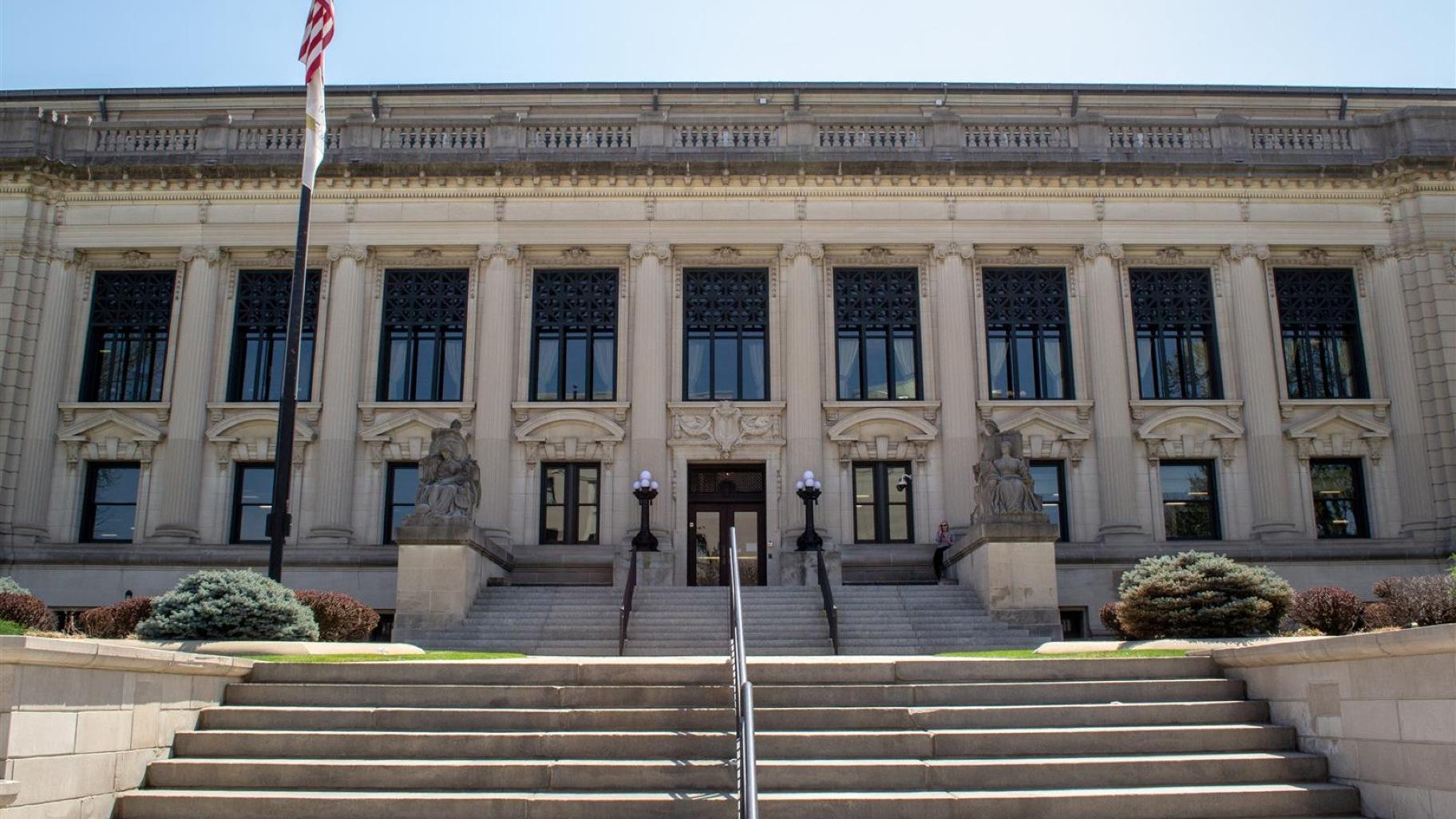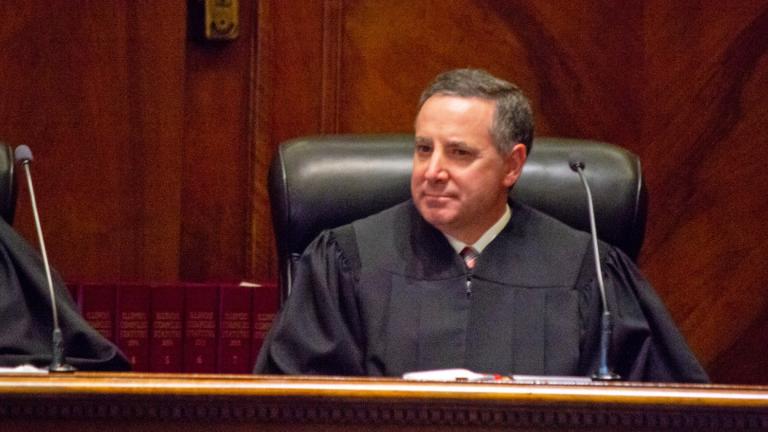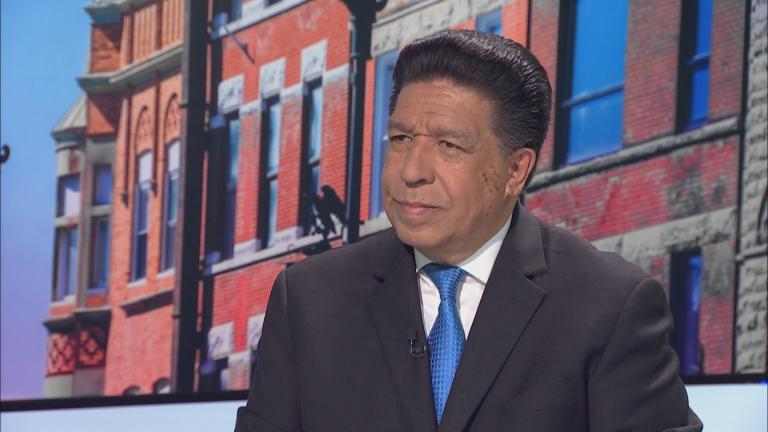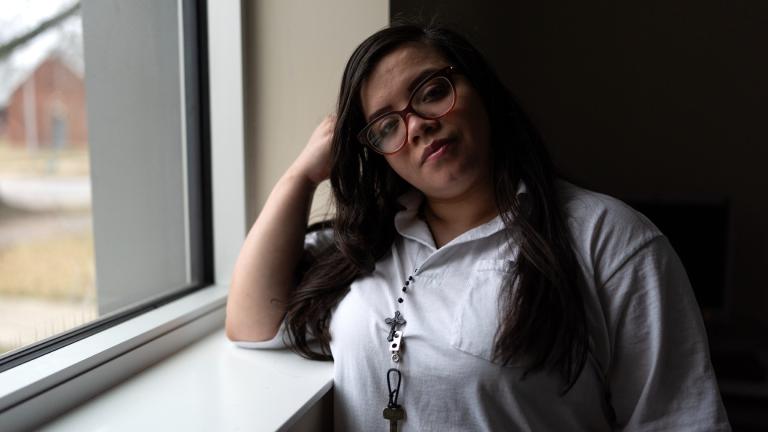 The Illinois Supreme Court building is pictured in Springfield. (Jerry Nowicki / Capitol News Illinois)
The Illinois Supreme Court building is pictured in Springfield. (Jerry Nowicki / Capitol News Illinois)
Justices on Illinois’ high court are reviewing what can be done to deal with a “breathtaking” swell of appeals cases connected to the SAFE-T Act, the massive state law that nearly six months ago eliminated cash bail.
The justices are seeking a number of changes, including legislative sign-off on making an office dedicated to pretrial services into its own standalone entity, and the creation of a new office to support public defenders.
According to Illinois Supreme Court Chief Justice Mary Jane Theis, the spike in appeals is the “biggest challenge” to the judicial branch’s implementation of the pretrial justice system.
“This dramatic increase in appeals has been crippling to our appellate courts,” Theis told state senators Wednesday during a statehouse hearing.
The vast majority of the appeals come from defendants seeking to overturn a circuit court judge’s determination that person should be kept in jail while awaiting trial, Theis said.
Within a decade-long period from 2014 through 2023, Theis said, there were a total of 171 appeals from bail orders.
In the first five months after the pretrial provisions of the SAFE-T Act went into effect — from Sept. 18 to Feb. 18 — there were 2,003 appeals filed from detention orders.
“There’s no doubt that there has been just a breathtaking increase in the number of appeals taken from those decisions,” Theis said. “There’s just been a huge increase of appeals since the new act came into effect.”
The controversial SAFE-T Act requires judges to decide whether to release defendants based on their flight risk and whether they pose a danger to public safety. Only those arrested for certain crimes can be detained.
Backers say it’s fundamentally fairer and safer given that someone with money could afford to pay bail even if that person is dangerous.
Critics argue Illinois’ pretrial justice overhaul is a weak-on-crime package that doesn’t give judges enough discretion to hold someone accused of committing a dangerous crime.
Theis said lower courts have been following a state Supreme Court rule that requires these types of appeals to be resolved within 14 days, which has put “tremendous pressure on the court, where, of course, there are all sorts of other important cases — child abuse cases, medical malpractice.”
That pressure led the state Supreme Court in February to create a task force to propose improvements to how those appeals move through the court system.
Theis said the task force presented justices with its findings on Monday, and that justices will soon take those “recommendations under advisement,” but indicated optimism that the changes will “get this issue under control.”
“I think we’re gonna see a change in the number of appeals,” Theis said.
A court spokesman said Thursday that the task force’s report is not yet public. He did not give a timeline but said it’s expected to be available “soon.”
Despite the surge, Theis said “our trial courts are functioning very well” operationally, in large part due to advance planning ahead of the SAFE-T Act taking effect.
As for the impact of the SAFE-T Act’s overhaul on the courts and on cases, Theis said it’s her “sincere hope” that pretrial data will be publicly available this summer.
“The administration of the Illinois courts leadership is working feverishly with all the 102 circuit clerks and their case management and measures to ensure apples-to-apples data is being collected,” Theis said. “The availability of statewide pretrial data is one of my primary priorities.”
Theis credited the Office of Statewide Pretrial Services, which was created in 2021, with helping those throughout the court system and law enforcement to navigate the shifts in how defendants’ cases are handled before going to trial. She said now that the office is fully operational, the state Supreme Court recommends the office be established as an independent state entity (House Bill 4621).
Theis made the remarks Wednesday at a state Senate appropriations committee hearing, during which she asked lawmakers, who are in the early stages of crafting a budget for the next fiscal year, to continue a trend of allocating more money to state government’s third branch.
The Illinois Supreme Court, which both hears cases and provides administrative oversight of Illinois’ judicial system, is seeking $569.1 million in state general revenue funds — $30.9 million more than the $538.2 million proposed by Gov. J.B. Pritzker.
“In recent years, the General Assembly has recognized the changing needs and increased demands of the courts by meeting the judicial branches’ funding requests,” Theis said. “Funding at the requested level for the fiscal year 2025 will allow the judiciary to continue to provide access to equal justice, ensure judicial integrity and uphold the rule of law of preserving community.”
The funding request includes continued support for a $10 million fund that last year supported public defenders. Theis said 65% of the money was used to hire new public defenders.
Although the Constitution guarantees criminal defendants the right to an attorney, “that’s not always true across our state,” Theis said.
Before the creation of the public defender fund, she said in 59 of Illinois’ 102 counties there was no public defender.
“This tremendous infusion of resources to public defenders has been nothing less than transformative to the historically under-resourced offices throughout Illinois that were dependent on scarce local revenues,” Theis said.
In White County, she said, the public defender had an annual operating budget of only $3,500.
“She bought her own legal pads,” Theis told lawmakers. “Because of the money that you appropriated last year we’ve hired lawyers all across the state. And now public defender (Myra Yelle-) Clark in White County has a case management system and a Zoom account and doesn’t have to pay for her own yellow pads.”
Yelle-Clark did not immediately return a message left on Thursday.
Theis also said the money is needed to help the judicial system modernize via an e-filing initiative and more data reporting.
Theis was unable to answer legislators’ questions about the impact of the SAFE-T Act on local courts, given its eradication of criminal bail bond payments and associated fees that were traditionally relied on to fund circuit court services.
“This issue of taking away the local counties’ fee and bond money is significant, and it is having real repercussions because local county boards are having to deal with it,” state Sen. Chapin Rose (R-Mahomet) said. “I’ve spoken to more circuit clerks, states attorneys and judges than I care to shake a stick at. And I’m pretty darn sure I’ve got a good handle how this is actually working — or not working — in my area: (It’s) not working.”
Tenth Judicial Circuit Judge Katie Gorman, who is serving as chair of the Conference of Chief Circuit Judges, said the financial situation of local courts is an “ongoing issue.”
“Bail or bond did make up a significant portion of the county’s budget,” Gorman said. “And so it’s a concern. Because it went into effect in September, the effect hasn’t really hit the county budgets yet, but it’s going to.”
The state Supreme Court’s budget request does not contain an ask for more money for appellate or circuit courts.
Rose asked for a “real number” that “needs to be shot at” so that courts are able to do the “things that they should be doing” but aren’t because of uncertainty over their budgets.
Contact Amanda Vinicky: @AmandaVinicky | [email protected]







